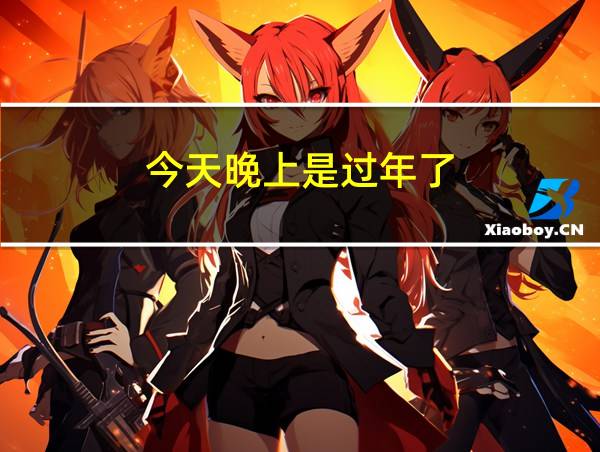今天晚上是过年了

Chinese New Year: A Joyous Celebration
Chinese New Year, also known as Spring Festival, is one of the most significant traditional festivals for the Chinese people. It is a time for family reunions, festive decorations, and delicious feasts. The festival begins on the eve of the Lunar New Year and lasts for 15 days.
The Origins of the Spring Festival Tradition
The Spring Festival, commonly known as the \"Year Festival,\" has its roots in ancient China. It has been celebrated since the reign of Emperor Wu of the Han Dynasty and is regarded as the start of the new year. The date of the festival is based on the traditional lunar calendar, and it marks the beginning of the Chinese zodiac year.
Since its beginning, the Spring Festival has been a time for people to pay respects to their ancestors and exchange blessings. Over time, the festival has evolved to include various traditions and customs, such as the lion and dragon dances, fireworks, and the giving of red envelopes.
One interesting custom observed in Shandong and other northern regions is the practice of bowing and greeting elders on the evening of the 30th day of the lunar calendar and on the first day of the new year. This tradition originated from the worship of ancestors and later extended to show respect to older family members.
In rural areas, age and seniority play a significant role in the celebration. It is considered inappropriate for someone of lower seniority to bow to those of higher seniority, regardless of their actual age.
The Significance of the Chinese Character \"年\" (nian)
The Chinese character \"年\" (nian) represents the concept of \"year\" and has deep cultural connotations. It is derived from the worship of gods and ancestors during the Yin-Shang period. The character is made up of the radical \"禾\" (he), which symbolizes grain, and the radical \"干\" (gan), which represents the stalk of a plant. Together, they symbolize the harvest and the cycle of life.
Throughout history, the character \"年\" has been associated with the passage of time, the changing of seasons, and the hope for a new beginning. It is often used in Spring Festival decorations and has become an iconic symbol of the festival.
The Joys of Spring Festival
Spring Festival holds a special place in the hearts of Chinese people. It is a time of joy, reunion, and festivities. Families come together to share a traditional dinner known as the \"reunion dinner,\" which includes various symbolic dishes and delicacies.
One of the most anticipated activities during Spring Festival is the setting off of fireworks. As the night sky illuminates with brilliant colors, it creates a vibrant and festive atmosphere. The sound of firecrackers and the dazzling display of fireworks symbolize the driving away of evil spirits and the welcoming of a prosperous new year.
Moreover, Spring Festival is not merely a celebration confined within the house. It extends to the streets, where people gather to watch colorful parades, lion dances, and other performances. The streets are adorned with red lanterns, which symbolize good fortune and ward off evil spirits.
Can We Celebrate Chinese New Year During the Dongguan Outbreak?
Whether or not individuals can return home to celebrate Chinese New Year depends on the current situation of the Dongguan outbreak. Factors such as the number of new cases and the complexity of their movement trajectories need to be considered. In order for an area to lift the restrictions, it usually requires a continuous 14-day period without any new cases.
While it is understandable that people want to celebrate this important festival with their families, it is crucial to prioritize everyone\'s health and safety. Following the guidance of local health authorities and adhering to preventive measures can help prevent the spread of the virus and protect the well-being of the community.
Preserving Customs and Traditions
The ban on fireworks and firecrackers during the Lunar New Year has been a topic of debate in recent years. While some argue that it is necessary to reduce pollution and ensure public safety, others believe that it diminishes the festive spirit.
As traditions and customs evolve, finding a balance between preserving cultural heritage and addressing environmental concerns is essential. Implementing regulations to manage the use of fireworks, such as designated areas and eco-friendly alternatives, can help maintain the joyous atmosphere of the festival while minimizing the impact on the environment.
In conclusion, Chinese New Year, also known as Spring Festival, is a cherished and significant celebration in Chinese culture. It is a time for family reunions, cultural traditions, and joyful festivities. With its rich history and deep cultural roots, this festival embodies the spirit of unity, hope, and renewal.
